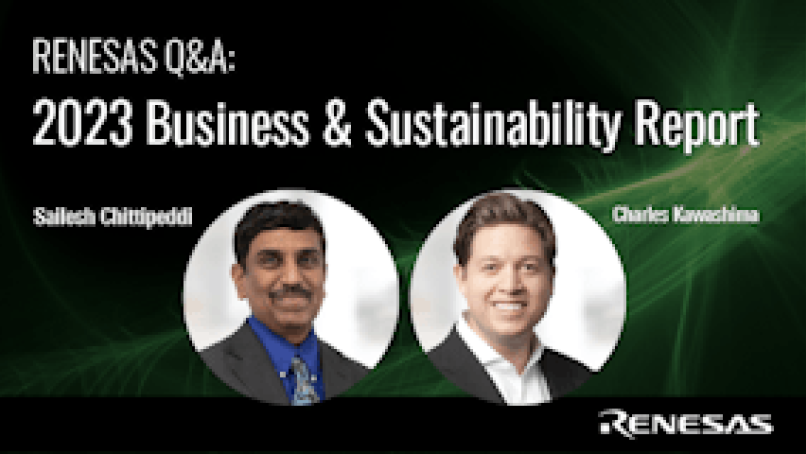In releasing our 2024 Business & Sustainability Report, Renesas showcased several milestones along the journey to enhancing our environmental stewardship and sustainable growth strategies.
Over the past year, the company reduced greenhouse gas emissions by 21.6% compared to 2021 levels through a series of energy conservation measures that included upgrading freezers, boilers, compressors, and pumps with new quality controls. Renesas scaled up its reuse of natural resources by harnessing vaporization energy released during the liquid-solid phase transition and implementing winter free-cooling to reduce the load on refrigeration systems. Other steps included waste heat recovery and reuse, and water spray humidification – a method of evaporative cooling that augments conventional mechanical heating and cooling systems.
Renesas maintained our waste recycling rate above the target of 90%, achieved a roughly 70% reduction in volatile organic compound (VOC) emissions compared to 2010 levels, and expanded global water resource conservation by setting – and meeting – water usage efficiency targets at our factories in Beijing and Suzhou, China. Including these activities, we achieved a 32% improvement in water usage by revenue compared to 2021 and a 32% water recycling rate.


Upon releasing the 2024 report, Renesas interviewed Takeshi Kataoka, Senior Vice President and Head of Operations, and Charles Kawashima, Vice President and Chief of Staff to the President and CEO, about the company's efforts in the areas of environmental conservation and sustainability.
Renesas: Kataoka-san and Charles, thanks for highlighting the most salient aspects of the Renesas 2024 Business & Sustainability Report. To begin, what are Renesas' biggest environmental risks, challenges, and solutions?
Kataoka: Thanks for the opportunity to address this important subject. In helping to compile the report, it was clear that Renesas is actively building toward a sustainable future.
Our goals are reflected in the challenges facing the broader semiconductor industry, which is energy-intensive and relies on significant water use and materials with high greenhouse gas (GHG) emissions. For Renesas, our most significant environmental risk remains climate change, and the solution lies in reducing GHG levels in line with globally recognized targets. Perfluorocarbon gases, also known as PFCs, account for about 80% of Scope 1 emissions, and we are setting reduction targets while optimizing processes to reduce PFC usage and working with suppliers to investigate gases with lower global warming potential.
To address Scope 2 gas emission targets, we are implementing energy-saving and renewable energy measures by purchasing FIT non-fossil certificates for electricity, which is our largest GHG emission source. We're also deploying solar power generation at production sites in China and Malaysia.
Renesas: How is Renesas balancing financial acceleration while minimizing environmental impact?
Kataoka: Understanding stakeholder expectations is crucial for balancing financial growth acceleration and environmental impact. To achieve both, we are implementing renewable energy use, more efficient resource utilization, environmentally conscious product design, social responsibility fulfillment, and transparency in reporting. We also recognize that this balance requires engagement across the entire supply chain, not just within our company, which is why we are cooperating with our suppliers to establish environmental standards necessary to reduce environmental impact.

Renesas: What new initiatives and programs are planned for 2025?
Kataoka: One initiative is accelerating the achievement of carbon neutrality. This fiscal year, we moved our carbon neutrality target up from 2050 to 2040. This acceleration came after studying stakeholder expectations last year and identifying gaps with our activities. Recognizing a global gap in our previously set climate change targets, we immediately set more aggressive goals. As a specific initiative, we set a new renewable energy implementation target of 100% by 2040.
Renesas: Are there other initiatives designed to meet stakeholder expectations?
Kawashima: Stakeholders expect us to contribute to a circular economy by maintaining financial growth while addressing climate change, developing sustainable products, and providing transparent environmental data disclosure. We evaluate our environmental performance through peer comparison and industry benchmarking to assess our position and identify areas for improvement.
To that end, we are implementing measures to achieve globally recognized environmental targets. For sustainable product development, we conduct product environmental assessments to manage chemical substances and reduce material environmental impact. We enhance data reliability through third-party verification reports and maintain transparency through the annual Business & Sustainability Report and regular website updates. Additionally, we actively promote environmental education for employees through bi-annual e-learning programs, which form the foundation of our sustainability activities.
Renesas: What progress did Renesas make last year from a governance perspective?
Kawashima: As part of our commitment to accelerate sustainability efforts, we established the Renesas Sustainability Department (SU), centralizing sustainability initiatives across the organization by integrating our environment team into the SU. This has enabled more efficient management of environmental initiatives through board-level oversight by enhancing efficiency and accountability, and ensuring regulatory compliance and stakeholder engagement.
Additionally, Renesas integrated sustainability into an Audit and Sustainability Committee to add a layer of governance oversight and established a Sustainability Operating Team (SOT) that is being led by the SU. The SOT coordinates sustainability initiatives across the organization. For example, the SOT Environment team leads efforts on energy reduction initiatives, while the SOT Procurement team drives supplier ESG assessments.
When departments fall short of their sustainability targets, we introduced an "Implement or Explain" approach that requires teams to detail why they missed their goals and present an action plan to the SOT.
Renesas: Looking ahead to next year, what are the top sustainability challenges you believe Renesas faces, and how is the board preparing to address them?
Kawashima: Challenges include strengthening our response to carbon neutrality targets, ensuring ESG compliance across the supply chain, and adapting to the rapid evolution of international regulations. To address these, we are fostering cross-divisional collaboration through the SOT and have developed action plans for 2030 and 2040 to advance sustainability-centered growth initiatives.
Of course, we strive to balance sustainability investments with short-term profit goals. To address this, the Audit and Sustainability Committee evaluates the long-term impact of ESG initiatives. Additionally, we are strengthening mechanisms to respond swiftly to regulatory advancements, positioning Renesas not only to ensure compliance but to be an industry leader in setting sustainability standards.
News & Additional Resources
Page Jun 10, 2025 |



